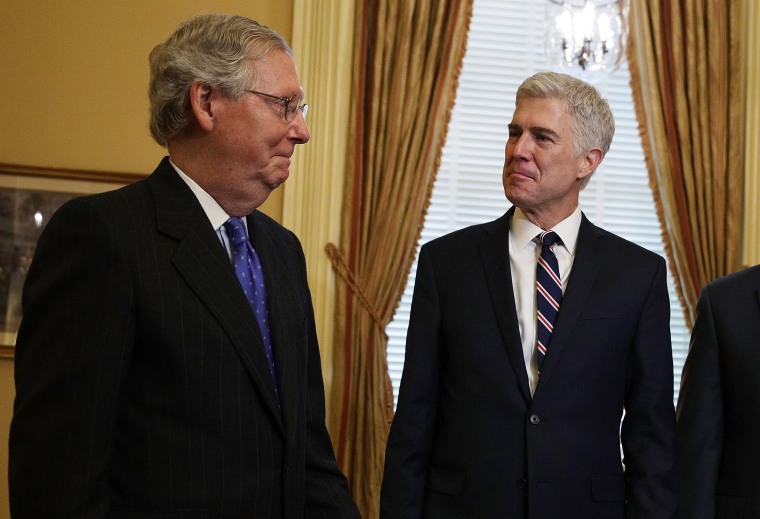WASHINGTON — When the Senate reconvenes this week, one of the first items of business will be the confirmation of six more of President Donald Trump's federal judicial nominees, adding more momentum to an already torrid pace that is remaking the federal bench and providing motivation for Republican voters ahead of this fall's midterm elections.
Over the first year-plus of Trump's presidency, Senate Majority Leader Mitch McConnell has taken advantage of the GOP's numbers and Senate rule changes to prioritize the confirmation of judges to lifetime appointments, putting a strong conservative imprint on the courts that could also pay dividends for the party's Senate candidates in a rocky election season.
Congress has not passed much major legislation aside from the ambitious tax cut and reform package the president signed into law. And there are no big initiatives on the horizon for candidates to tout on the campaign trail. But McConnell, a tactician acutely aware of electoral politics, has given GOP voters a growing number of young conservative federal judges who could sit on the bench for 30 to 40 years.
“Circuit judges have been my top priority,” McConnell told Fox News last month. “We’re not behind on circuit judges; we’re way ahead.”
The Senate, mostly on a partisan basis, has confirmed 15 circuit court judges since the beginning of Trump’s term — more than any of the last five administrations at this point in their terms. And the pace of confirmations has far exceeded that of President Barack Obama's administration, when it took an average of 165 days to confirm a judge compared with just 14 days under the Trump administration, according to data compiled Senate Judiciary Committee Democrats.
“I can tell you this, not speaking for myself, but (McConnell) definitely said it’s a major priority and has been for the last 18 months,” Sen. Chuck Grassley, R-Iowa, and chair of the Senate Judiciary Committee, said of the administration and McConnell.
Charlie Sykes, conservative author, commentator and host of The Daily Standard podcast, said the court is a top issue for many conservatives in elections and will help to motivate the party's anti-abortion and pro-gun voters.
"On a scale of one to 10, the issue of conservative judges would rank as an 11," Sykes said. "It is difficult to overstate how important it is for the Trump base."
For McConnell, it's been about the long game. In the final year of Obama's presidency, the majority leader set new precedent by refusing to consider the nomination of Merrick Garland to replace Justice Antonin Scalia on the Supreme Court. It's a move that still angers Democrats and one that McConnell partly credits for electing Trump.
Just three months into Trump's term, the Senate voted to confirm his choice, Neil Gorsuch, to the high court. That helped reassure some skeptical Trump voters.
"Walk through the litany of Trump outrage and disgust and slurs, and they’ll come back with ‘but Gorsuch — at least we got Gorsuch,'" Sykes said.
But the focused effort to fill court vacancies with conservative appointments hasn't been without controversy. The U.S. Court of Appeals is the last stop before a case reaches the Supreme Court and those nominations have become highly partisan.
Only three judges passed with significant support:
- Elizabeth Branch of Georgia was confirmed to the 11th Circuit with the support of 73 senators.
- Ralph Erickson of North Dakota was confirmed to the 8th Circuit, 95-1.
- Kevin C. Newsom of Alabama passed 66-31 for the 11th Circuit.
Three nominees have withdrawn because of a lack of qualifications and their inability to gain the support of enough Republicans to pass through the Senate.
The other 12 passed on a largely partisan basis, with no Democrats voting for three of the nominees — all criticized by Democrats on issues ranging from their position on abortion, LGBTQ issues and civil rights as well as being labeled by the American Bar Association as unqualified. They are:
- Don Willett of Texas for the 5th Circuit
- Steven Grasz of Nebraska for the 8th Circuit
- John Bush of Kentucky for the 6th Circuit.
Republicans have had success with judicial nominees in large part because of a rule change in 2013 when then-Senate Majority Leader Harry Reid, frustrated with an inability to pass Obama nominees, changed the threshold to move forward on judges from 60 votes to 51.
“That’s one thing we can do with 51 votes, and it’s going to last long beyond the current administration,” Sen. John Cornyn, R-Texas, and a member of GOP leadership, said of prioritizing judges.
Democrats complain that Republicans are breaking precedent, allowing nominations to move forward even without the consent of both of the nominee's home state senators.
One of the six nominees set to be brought up next week, Michael Brennan of Wisconsin for the 7th Circuit, will be brought before the full Senate despite the opposition of Sen. Tammy Baldwin, D-Wis.
“I’m actually very worried right now,” Sen. Cory Booker, D-N.J., said. “In this case, it just means the speed at which they’re ramming these judges through — we’re seeing people that are less qualified, more extreme, and I think this is problematic for the short term and the long term.”
And Republicans are looking to make the process even easier to confirm more judges, calling Democrats obstructionists for forcing the full 30 hours of time to pass before a vote. They are now attempting to change the Senate rules to speed up the confirmation by limiting the amount of debate time to two to eight hours.
Senate Democratic Leader Chuck Schumer of New York says Republicans can’t assert their success of judicial confirmations and also complain about obstruction simultaneously.
“Well, I say to my Republican friends and the president, you can’t have it both ways — on the one hand, ‘historic obstruction,’ and on the other, a ‘record’ pace of confirmations that you brag to your base about,” Schumer said. “Can’t have it both ways.”
